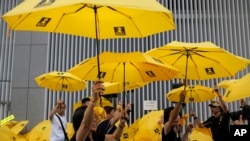A year ago, Hong Kong's famously busy streets were shut down by pro-democracy protesters in the so-called "Umbrella Movement", a moniker that came from the umbrellas used by demonstrators to fend off pepper spray used by police early in the nearly 80-day face-off.
Students, retirees and others took to the streets to express their opposition to Beijing's plan to restrict candidates in elections for the city's top leader. Hong Kong is a semiautonomous part of China, with its own legal system, free-wheeling press and local government, but is ultimately under Beijing's rule.
The movement, also called Occupy Central, saw thousands of people gathering at rallies and camping out in the streets. The demonstrations fizzled out as the government stuck to a hard line and authorities eventually cleared out the protest camps.
Today there is little physical sign of Hong Kong's biggest turmoil since its handover from Britain in 1997, but the event appears to have sparked a political awakening among many of the city's younger generation amid signs of mainland China's tightening grip.
Last year, Associated Press photographer Vincent Yu captured images of a number of these protesters and asked them, "How has Occupy changed Hong Kong? And what's the future of the movement after the protest?" Nearly a year later, Yu took photos of the same group and asked, "Has the Umbrella Movement accomplished anything? If so, what?"
___
Melvin Lee, 43
Then: "We have never been this resolute, never this determined. ... Hong Kongers will be more concerned with issues on rights, and be more careful on its political policy. They will not simply allow others to represent them ... but instead will express their views by themselves."
Now: "It has no result practically. However, after the 79 days [of] Occupy, we can see clearly whether a person is a man or demon. As far as I can tell, it provoked concerns and actions of a large group of young Hong Kong people toward current affairs and politics."
___
Mo (only surname given), 23
Then: "Many Hong Kong people have woken up. ... I firmly believe Hong Kong people will fight for the things they want."
Now: "I think Occupy tells Hong Kong people that peaceful protests won't achieve anything. After Occupy, neither democracy, universal suffrage nor the separation of powers were successfully achieved. I believe this has made a small amount of Hong Kongers know only a more radical way of protests can fight against authorities."
___
Kelvin Lee, 22
Then: "It has made many students begin to show political awareness. ... Honestly, in the imminent short term, Hong Kong will not have too many changes. But in the long run, this movement is an important milestone."
Now: "Even though the end of Umbrella Revolution did not make any significant changes, it increased the attention of society. And though there were many contradicting opinions made, it awoke people, especially teenagers, to how the society was changing."
___
Hackin Tse, 39
Then: "It has increased people's civil awareness, but the youngsters have yet to learn many things. ... The development of the movement has come to a time when they should take a turn, but they still haven't realized it. Some people just want to get the aura of glory, yet have done nothing since the beginning. They don't know their rights and duty."
Now: "The Umbrella Movement has brought out an answer for those selfish people who hate politics that civil education, political livelihood and civil obligations are inevitable. After the handover, democratic politics and the rule of law are something that every Hong Konger should learn about in his lifetime."
___
Tabris Ho, 26
Then: "Firstly, it exposes to public knowledge that the youths in Hong Kong are not like hothouse flowers. They can stand the test of hardships and challenges."
Now: "Speaking of the result, it achieved nothing at all. It couldn't fight for any change on political reform plans. Yet it had great influence. ... More civic society organizations and political groups sprang up, showing increased political participation of citizens."
___
Suen Yuk Ming, 21
Then: "Even if we can't achieve democracy, this movement will pass down through history and become a reference for other social movements, paving a path for future protest."
Now: "It provided a space for people to think about Hong Kong's future, underpinning social movement in the future."
Summer Tsang, 25
Then: "More people will be concerned about politics, more people will stand up. ... This time it's an irreversible change. So many young people have been fighting more fiercely than before, that from now on it will never again be as tranquil as it was before."
Now: "Occupy Central has no result at all! ... Young people start to question whether they should be less involved in Hong Kong's society, or incubate larger protests."
___
Jay Koon, 20
Then: "More youths now care for Hong Kong. ... If needed, a large crowd of citizens are ready to come out and sacrifice. The previous demonstrations were like carnivals, but the future movements will never be the same."
Now: "It's unfair to say the Umbrella Movement hasn't achieved anything. For Hong Kong, the political reform proposal is vetoed and we have prevented the worst scenario from happening. There is a huge impact to individuals as well. Participating in the movement provided us opportunities to distinguish between right and wrong, it also helped us realizing what kind of persons we would like to be in the future."







